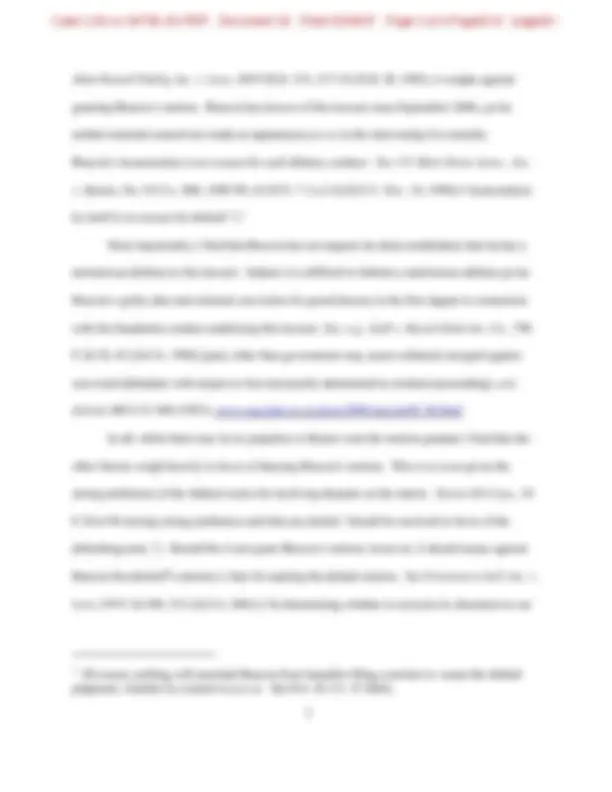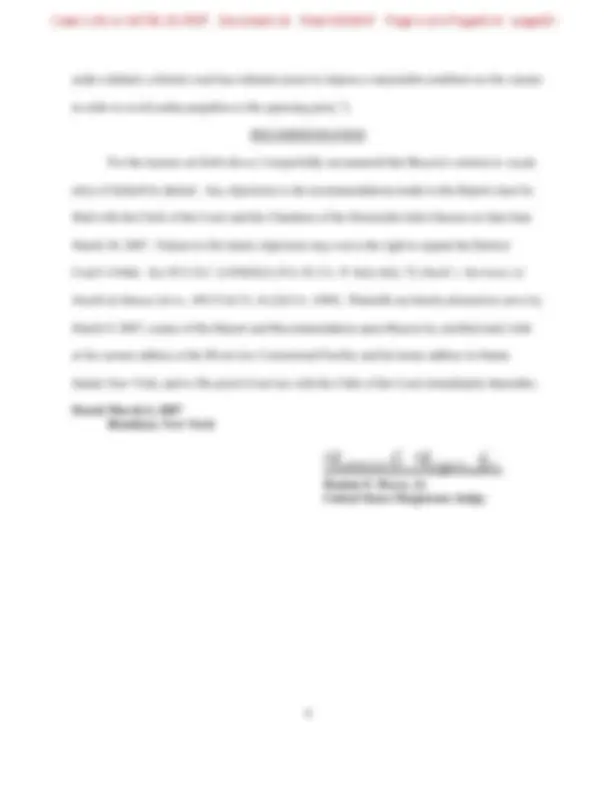




Study with the several resources on Docsity

Earn points by helping other students or get them with a premium plan


Prepare for your exams
Study with the several resources on Docsity

Earn points to download
Earn points by helping other students or get them with a premium plan
Community
Ask the community for help and clear up your study doubts
Discover the best universities in your country according to Docsity users
Free resources
Download our free guides on studying techniques, anxiety management strategies, and thesis advice from Docsity tutors
A report and recommendation from a magistrate judge in the eastern district of new york regarding a motion to vacate entry of default in a civil lawsuit. The defendant, salvatore braccia, argued that his default was not willful and that he should be granted relief to retain counsel. However, the judge found that braccia had adequate notice of the lawsuit and his default was willful. The judge also found that braccia did not establish a meritorious defense. The judge recommended that the motion be denied, and if granted, the plaintiff should be awarded attorney's fees.
What you will learn
Typology: Exercises
1 / 4

This page cannot be seen from the preview
Don't miss anything!



(^1) The standard for setting aside an entry of default pursuant to Rule 55(c) is “lenient” and less rigorous than the standard for setting aside a default judgment pursuant to Rule 60(b). American Airlines Ins. Co., Ltd. v. Eagle Ins. Co. 274, 277 (2d Cir. 1981) (describing the Rule 55(c) standard as “lenient”)., 92 F.3d 57, 59 (2d Cir. 1996); Meehan v. Snow, 652 F.2d
Plaintiff, REPORT & RECOMMENDATION
(^2) Notably, Mrs. Braccia, who originally received the summons and complaint, notified Braccia in prison of the report and recommendation almost immediately after it had been issued. Docket No. 17 (“I only became aware of this motion when my wife was sent the papers filed by the plaintiff’s attorney... “). Thus, it is reasonable to conclude that Mrs. Braccia promptly provided Braccia with a copy of the summons and complaint on or about September 26, 2006.
default.. .”). Although Rule 55(c) does not define “good cause,” the Second Circuit has instructed that district courts must consider principally “(1) whether the default was willful; (2) whether setting aside the default would prejudice the adversary; and (3) whether a meritorious defense is presented.” Enron Oil Corp. v. Diakuhara , 10 F.3d 90, 96 (2d Cir. 1993). Of course, the decision on whether to grant relief from the entry of default is left to the sound discretion of the district court as it is in the best position to assess the individual circumstances of a given case and to evaluate the credibility and good faith of the parties. Id. Construing Braccia’s pro se motion liberally, as I must, e.g., Weixel v. Board of Education of New York , 287 F.3d 138, 146 (2d Cir. 2002), he argues that his default was not willful because he was not properly served due to his incarceration, and therefore entry of default should be set aside. Any such argument is without merit. Braccia claims that he has been incarcerated since October 19, 2006. Docket No. 17. The certificate of service makes clear, however, that Braccia was properly served before he was incarcerated. Docket No. 11. On September 26, 2006, a copy of the summons and complaint was served on Braccia’s wife, at his home, and copies were also mailed to him there on September 27, 2006. Id. ; see also FED. R. CIV. P. 4(e)(1) and (2); N.Y. CIV. PRAC. L. & R. § 308(2). Thus, Braccia had adequate notice of this action, and his default was therefore willful.^2 I also find uncompelling Braccia’s argument that entry of default should be set aside so he may retain counsel to defend against this action. While this factor should be considered, see
aside a default, a district court has inherent power to impose a reasonable condition on the vacatur in order to avoid undue prejudice to the opposing party.”). RECOMMENDATION For the reasons set forth above, I respectfully recommend that Braccia’s motion to vacate entry of default be denied. Any objections to the recommendations made in this Report must be filed with the Clerk of the Court and the Chambers of the Honorable John Gleeson no later than March 30, 2007. Failure to file timely objections may waive the right to appeal the District Court’s Order. See 28 U.S.C. § 636(b)(1); FED. R. CIV. P. 6(a), 6(e), 72; Small v. Secretary of Health & Human Servs. , 892 F.2d 15, 16 (2d Cir. 1989). Plaintiffs are hereby directed to serve by March 9, 2007, copies of this Report and Recommendation upon Braccia by certified mail, both at his current address at the Riverview Correctional Facility and his home address in Staten Island, New York, and to file proof of service with the Clerk of the Court immediately thereafter. Dated: March 6, 2007 Brooklyn, New York
Ramon E. Reyes, Jr. United States Magistrate Judge